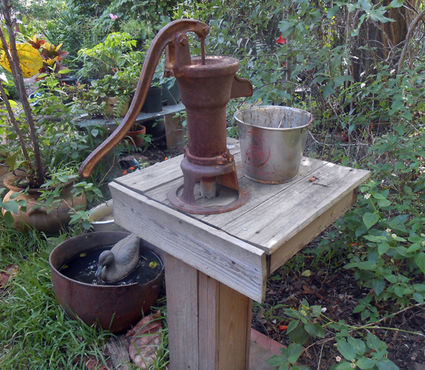Those old cotton fields back home
Last updated 7/31/2013 at Noon
The knowledge of mankind has fast-forwarded to unbelievable heights in the span of one lifetime but morals and life styles have dipped to unbelievable lows once unheard of.
When I was a lad in the Cajun country in the late ‘30s and ‘40s, South Louisiana was no paradise. The heat and dust, along with humidity, were almost unbearable. Dust so heavy it filled your nostrils, your body became covered with the mixture of dust and sweat. You could have raised cabbage in your belly button. Dirty work in the field was a way of life for Mom and me.
When August came around, it meant cotton-picking time. I’ve always believed the Lord didn’t intend for cotton to be planted in that part of His world. I’m thankful, however, that He chose to put the Cajun and the crawfish down in the same place. The cotton grew back breaking short, a half bale to the acre was considered a bumper crop.
Mom and I would rise early; fix some kind of lunch that we brought to the field in a syrup bucket. I toted the gallon water jug as we made our way the mile or so down the dirt road to the cotton field. I would place the jug under cotton plants to keep it from boiling. In my mind, I can still taste that very warm water. We would nurse that jug all day, wasting a little only to wash the dirt out of our eyes.
Mom wore a feed sack bonnet, long dress with a long sleeve shirt. I wore a straw hat and went barefooted, but the rest of my body was covered. We put cotton leaves in our head gear to prevent heatstroke. The straps on the cotton-picking sacks went around one shoulder and the neck. We dragged those long sacks behind us row after row until they were full. Then we would take them to the weigh-in man who marked down the weights and dumped the cotton in the wagon. When the wagon was full he drove it to the mill, mule-drawn, and had it baled.
The backbreaking chore was mastered by some, but not Mom and me. The pay was 35 cents a hundred pounds, but we seldom went home with more than 50 cents for picking from sunup to sundown. Even in that sorry cotton field, some people picked a couple of hundred pounds. I’ve seen some of the black women walk up and down those rows on their knees dragging the sack. At the end of the day, they earned maybe a dollar each. Sounds like a lot of work for little money, but a little money bought a lot back then. Two gallons of coal oil cost a dime, sugar a nickel, 15 loose eggs were 10 cents, flower and corn meal cost just pennies.
We picked six days, so two or three dollars went a long ways toward feeding us.
Our clothes were made from feed or flour sacks and my britches usually were hand-me-downs donated by someone.
We didn’t have electricity or any of today’s conveniences.
We had a hand-pump water well that we would prime and draw our water from.
I still have that same old pump today displayed in our courtyard.
The sand settled to the bottom of the bucket, and we carefully scooped the water from the top for drinking and cooking.
Bathing was a different matter.
The water was drawn in a No. 3 wash tub.
If it wasn’t a cloudy day, the sun would heat the water for bathing.
We got our major baths on Saturday night.
My grandmother, Availa, who lived next door to us, checked me out.
If I didn’t pass inspection, she would nearly draw blood with a bristle brush on my neck, ankles and knuckles.
We used homemade lye soap.
It burned like hell when it got in the eyes.
I never was fond of cotton picking, but I never complained. I was guilty of feeling sorry for myself at times. I do recall some fun times in the cotton patch; the black pickers sang and told funny Cajun stories. Mostly what’s important was Mom and I doing something together. The morning walk to the field, just she and I, are memories that live on. Sometimes when we helped gather the cotton at other farms three or four miles away, they would pick us up, along with a dozen or so others, in a mule-drawn flat wagon. We often arrived back home at dark.
Cotton farms are no more in Vermillion Parish. Sugar cane fields have replaced cotton. Working the cane fields in October was my favorite farm job. Picking cotton was hard and dirty work, but I’d do it all over again just to share those times with Mom one more time. Unfortunately, Mom, who suffered from Alzheimer’s Disease, passed away Sept. 1, 2004.
A million incidents have occurred to me down life’s highway since those long ago days. I’m not sure of the value I may have gained from living a life of poverty and hard work. I just know it was essential at the time, and you do in life what you have to do. I decided back then that I wanted to be the guy who drove the team of mules and wagon to the gin, bailed it and collected the money from the crop someone else had picked.
Life wasn’t easy for a lot of people during those depression years, but for a single Mom, it was awfully difficult just to provide the bare necessities. Often she didn’t make it.
The flickering light from the coal oil lamp glowed brightly with love in our little one-room shack. From my corn shuck palette on the floor I dreamed about tomorrow and a better life. I left the cotton fields as soon as I could get away. The family values and the importance of pulling together that I learned has followed me all of my days.
Strange as it may sound, I feel blessed to have lived then. When August comes around each year my thoughts turn to a simpler time with no frills, when a little money, that didn’t come easy, meant so much. A time when crime and molestation didn’t exist and honoring one’s parents was a way of life.
Sometimes today, I catch myself complaining about the heat and small difficulties of the day and repent by thanking the Lord for our many blessings that this easy life has led us to take for granted.
I regret that we have become a shameless, lazy society that takes rather than gives.
I marvel at how the world has changed.
No one in my youth could have imagined it.
I learned from those cotton days that even unpleasant things have a benefit.
If the cotton was late, we got a lagniappe (bonus).
We didn’t have to start school until all the cotton was gathered from the fields.
I admit when I got to high school and the August football two-a-days are not anything that I’ve ever missed.
That’s before drinking water, during a two hour workout, was allowed, salt tablets were plentiful and the coach was a former WWII Army Sergeant.
Those days, along with the cotton picking days, molded me and any success I’ve had I can trace back to the distant past.
So we should look for something good from all the bad, as difficult as it seems.
This old pump I drew water from as a child reminds me daily of a time long ago.








Reader Comments(0)